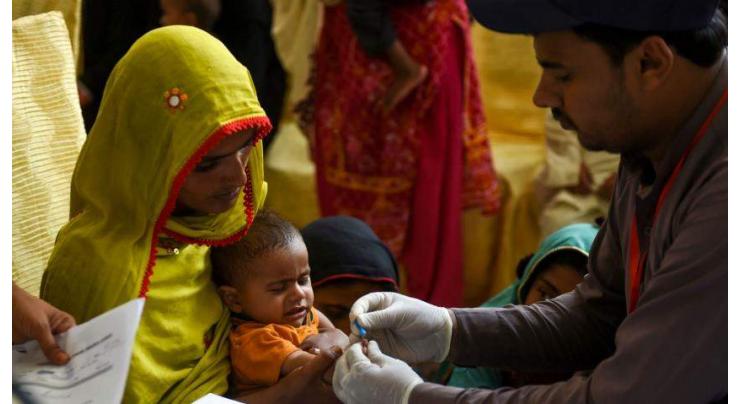
Experts Seek Protection Of Rights Of Children Tested HIV Positive
Muhammad Irfan Published December 14, 2019 | 07:48 PM

Prompt and efficient identification of children at risk to contract Human Immuno Virus with fool proof mechanism to ensure regular and efficient treatment, adequate follow-up and "No" provision for "Lost Kids" diagnosed with the virus was largely felt in a session held here Saturday
The event jointly organized by Pediatric department of Civil Hospital, Karachi and a local NGO "Konpal" working for Prevention of Child Abuse was particularly focused on prevention rights of children against HIV/AIDS and also the prerogative of child carriers to a dignified life.
Speakers included Prof. D.S.Akram, Dr. Fatima Mir, Dr. Yousuf Yahya, Dr. Iqbal Soomro, Prof. Aisha Mehnaz, Prof. Muzzamil Shabana Ejaz, Prof. Fehmina Arif, Dr. Khalid Shafi - representing the fraternity of pediatricians, infection control experts and doctors treating HIV/AIDS patients.
They were unanimous that HIV/AIDS have emerged to be quite prevalent hence can no more be ignored and that possible (more than often severe) implications demanded proper understanding among the medical community, including doctors, nurses, paramedics, lady health workers and so-forth about prevention and efficient handling of the cases, without any paranoia, as this was noticed to have violated the rights of the patients.
Strong exception was also taken to misconcpetions about spread of HIV leading to ostracization of the individuals (including children) having contracted the virus due to no fault of their own.
As for the surge registered in the incidence of HIV in the country, speakers attributed it to non availability of quality health services to significant majority and also the rampant belief that drips and injectable medicines help quick and efficient recovery from simple to moderate degree of diseases - with little regard for safe injecting practices.
Cases reported from different parts of the country during recent years were found to be mainly caused due to exposure of unassuming individuals to contaminated needles (syringes/drips) or addicts with marked choice for intravenous drug use.
This was reminded to be against previous experiences of vertical transmission or infected blood transfusions to patients, mainly thalassemics.
Dr. Fatima Mir, consultant Infectious Diseases, Aga Khan University in her elaborate presentation mentioned that the HIV Treatment Centre established at AKU in 2006, for many years received 70% cases of vertical or mother to children transmission and 30% of those children suffering from thalassemia.
This during 2010-2014, she said turned to be 50% thalassemic kids and 50% mother to child while by 2015 to 2019 it was 30% vertical transmission, 30% thalassemia related and 40% unknown factors.
"We have no reason not to accept that trend to seek injection for any health related condition, even fever, and disregard for safe injecting practices could be the cause," said the senior health care providers treating child HIV patients for quite some time.
Dr. Yousuf Yahya , Assistant Prof, Paediatrics Ward, CHK seconded her co-speaker and also referred to the issue of patients failing to continue with their drug therapy or not turning up after first few visits, that otherwise could help them lead an otherwise quality life.
The issue of sense of fear registered among many of the medical practitioners coming across HIV patients or infected substance was also discussed on the occasion and need for adequate information and knowledge about their possible vulnerability was recommended.
Meanwhile, a representative of Sindh AIDS Control Program, Dr. Aziz handling Infection Control in different public sector facilities referred to steps taken in this regard.
Dr. Ayesha Mehnaz highlighted importance of regular capacity building of doctors and other support staff in face of new emerging health conditions.
Recent Stories

Usain Bolt named ICC Men’s T20 World Cup 2024 Ambassador

PM visits martyred Customs official's residence in Abbottabad

Ethiopian Special envoy urges Lahore's traders fraternity to join trade delegati ..

Kazakhstan envoy meets commissioner

Safari Park to welcome Madhubala elephant in May

2 ring leaders among 3 terrorists killed in Khyber operation

Govt committed to developing gems, jewelry sector: Minister

Punjab CM Maryam faces legal challenge for wearing police uniform

PTDC plans to organize two-day tourism expo

COP29 host says deal on climate aid essential but offers few details

SC orders end of encroachments in Karachi

Nazish Jahangir denies viral screenshots, calls them fake
More Stories From Health
-

Vaccines save at least 154 million lives in 50 years: WHO
23 hours ago -

UHS to issue MBBS degrees within three months after final result
1 day ago -

Rawalpindi woman gives birth to six babies
6 days ago -

DC calls for intensive anti-polio drive in ICT
7 days ago -

World Hemophilia Day observed to underscore importance of providing comprehensive care
8 days ago -

Six in a family with heart on the 'right side'
8 days ago
-

Diabetic disease increasing rapidly : Dr. Noor Elahi Memon
8 days ago -

World Hemophilia Day observed
8 days ago -

ATC dismisses bail petition of doctor involved in illegal kidneys transplant
16 days ago -

Dr. Shehzad warns against deviation from WHO guidelines on anti-smoking
16 days ago -

Health activists express concerns over attempts to derail tobacco control
18 days ago -

UHS declares MBBS first prof, MS urology exam results
27 days ago











